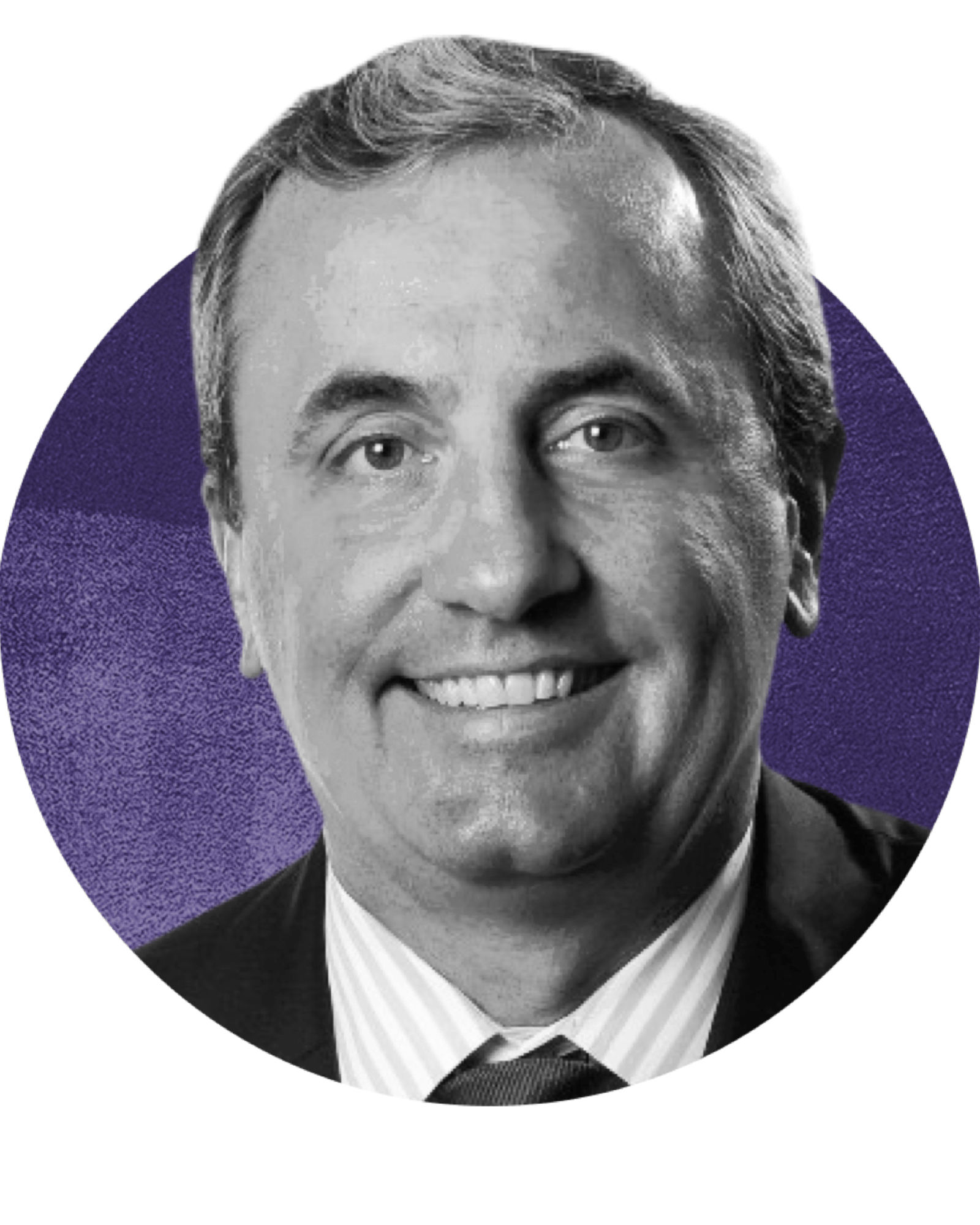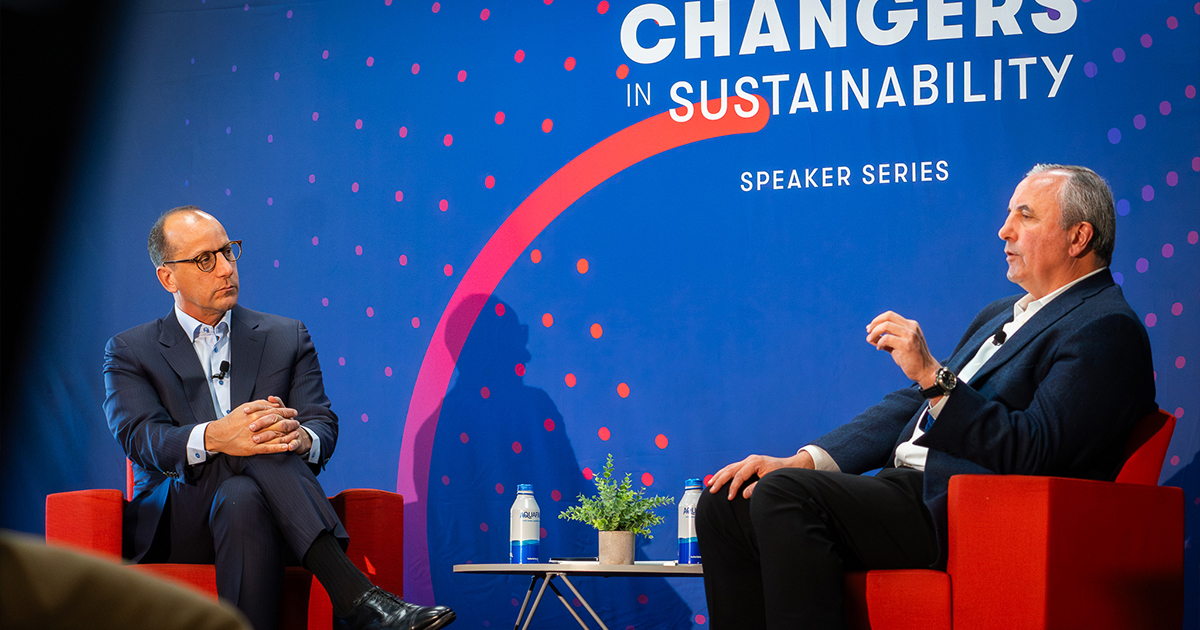
Kogod School of Business
With around 400,000 employees and $45 billion in revenue last year, EY is undoubtedly one of the world’s most influential companies, as one of the so-called “Big Four” accounting firms.
However, in recent years, the fast-growing professional services firm has also become a leader in critical initiatives that double as strategic priorities here at the Kogod School of Business, from emphasizing sustainability and diversity to doubling down on artificial intelligence.
Add in the fact that the company is among the largest employers of AU graduates, with some 400 alums in its ranks, and its chief executive would seem a fitting guest to welcome to campus, as Kogod Dean David Marchick acknowledged during an April 23 discussion with Carmine Di Sibio, EY CEO.
“You made basically three bets, which are very consistent with what we’re doing here at Kogod: diversity, sustainability, and AI,” Marchick said. “And we’re betting on the same.”
Marchick’s comment came as part of an hour-long discussion hosted by the Kogod School of Business’s innovative Gamechangers in Sustainability Speaker Series, which examines how the most innovative leaders create a more sustainable world.
An Early Focus on Hard Work
An Italian immigrant who moved to the US at age three, Di Sibio hailed from a family that prioritized knowledge and hard work.
“They really valued education,” Di Sibio said of his parents. “Making sure we were educated more than they had been educated was paramount to them.”
Growing up in a suburb outside of New York City, Di Sibio went on to study chemistry at Colgate University, initially aspiring to become a physician. However, an internship would endear him to the world of business and accounting, ultimately prompting Di Sibio to pursue his MBA at New York University.
In 1985, he began his career as an auditor at EY's predecessor, Arthur Young & Co., solidifying his base within the company’s growing financial services businesses.
That would kick off a nearly four-decade run that would see Di Sibio work his way through EY’s ranks before ultimately being appointed global chairman and CEO in 2019.
Since then, EY has proliferated. As Marchick pointed out, when Di Sibio assumed his post five years ago, EY had around 270,000 employees and $35 billion in revenue. That’s a far cry from the 400,000 team members today—not to mention the company’s $50 billion in revenue last year.
“What’s spurred that growth? One thing is technology. That’s a big piece; companies need a lot of help in terms of implementing technology,” Di Sibio told the audience. “That was very big for our consulting business.”
However, a more recent phenomenon, Di Sibio said, involves sustainability and artificial intelligence.
Emphasizing Sustainability
During his tenure as CEO, EY has, under Di Sibio, placed a premium on sustainability.
In keeping with the company’s historic strategy for rolling out a major new initiative, EY's sustainability focus began internally at EY and then spread to its client advice.
We typically take something that’s a new phenomenon that’s going on, we start it central, we build the brand, and then we push it into our businesses. And so, that’s exactly what we did around sustainability.”

Carmine Di Sibio
CEO, EY
Under his leadership, the company appointed its first-ever chief sustainability officer and vastly increased its internal sustainability reporting.
EY says it’s already carbon-negative and hopes to reach net zero by 2025.Meanwhile, Di Sibio noted that on the consulting side, EY is far better equipped to work with clients on sustainable practices, reporting, and strategy—which are increasingly a company priority.
“What’s really flipped the switch on sustainability is when the investors—when the asset managers—have said, ‘You know what, we want to invest in sustainable businesses,’” Di Sibio said. “That, all of a sudden, has put a lot of pressure on companies to be sustainable.”
Di Sibio has also emphasized diversity, equity, and inclusion during his tenure as CEO. He co-chairs EY’s Global Diversity and Inclusiveness Steering Committee, which focuses on harnessing different opinions, perspectives, and cultural references within the organization.
EY developed a tracker it uses to achieve its own goals in diversity, equity, and inclusion (which it has likewise deployed to use with clients, too).
Di Sibio said the strategy has fueled internal improvements in the diversity of its staff and leadership.
Today, 34 percent of EY’s new partners in the organization are women. While short of its ultimate goals, Di Sibio said, it’s an improvement from around 23 percent a decade ago and 14 percent some 20 years ago.
The company’s global board of directors has also become more diverse— in terms of race, gender, and geography—he added while noting that EY has also bolstered its recruiting efforts to promote a more diverse pool of applicants to open positions as the firm.
“We’re proud of what we’ve been able to do, but we’re not done,” Di Sibio said.
If you want to attract the best talent, you’re not going to be siloed and only hire people that look the same or work the same as you.”

Carmine Di Sibio
CEO, EY
Investing in AI
Di Sibio’s tenure as CEO has also coincided with the breakneck pace at which artificial intelligence has grown in prominence.
Starting in 2019, he led the development of EY’s NextWave strategy, which saw the company invest billions of dollars dually geared toward boosting client tools around AI while upskilling its workforce.
EY signed up for 20,000 licenses of Microsoft’s Copilot AI tool and developed a training regimen for staff to gain certification “badges” as they learn new skills around the emerging technology.
Similar to its approach around sustainability, EY has simultaneously deployed AI to client relations, too, in an effort to ensure the most cutting-edge technology reaches each of its major areas of business.
The technology has improved productivity, Di Sibio said. For instance, EY has realized 20-30 percent productivity gains in some aspects of its auditing business.
In the long term, though AI likely won’t reduce EY’s workforce, Di Sibio explained, it may affect future headcount decisions, allowing the company to continue its upward trajectory while perhaps not hiring at the same rate that it would for similar growth today.
“We will continue to grow, but probably with fewer people, using more AI and technology,” Di Sibio said. “We won’t need 400,000 people for the same growth.”
It’s a future landscape that, Marchick pointed out, Kogod students will be prepared for, owing to the school’s recent announcement that AI will be part of every aspect of the curriculum beginning in the fall of 2024.
“We’re incorporating all of the things that employers want our students to have,” Marchick said.
This emphasis, which Di Sibio concurred, should bode well for Kogod students hoping to join the hundreds of AU alumni already at EY.
“Learning AI, sustainability,” Di Sibio said, “Those are the things that are going to differentiate you versus everyone else.”
Check out future Kogod School of Business events here.
